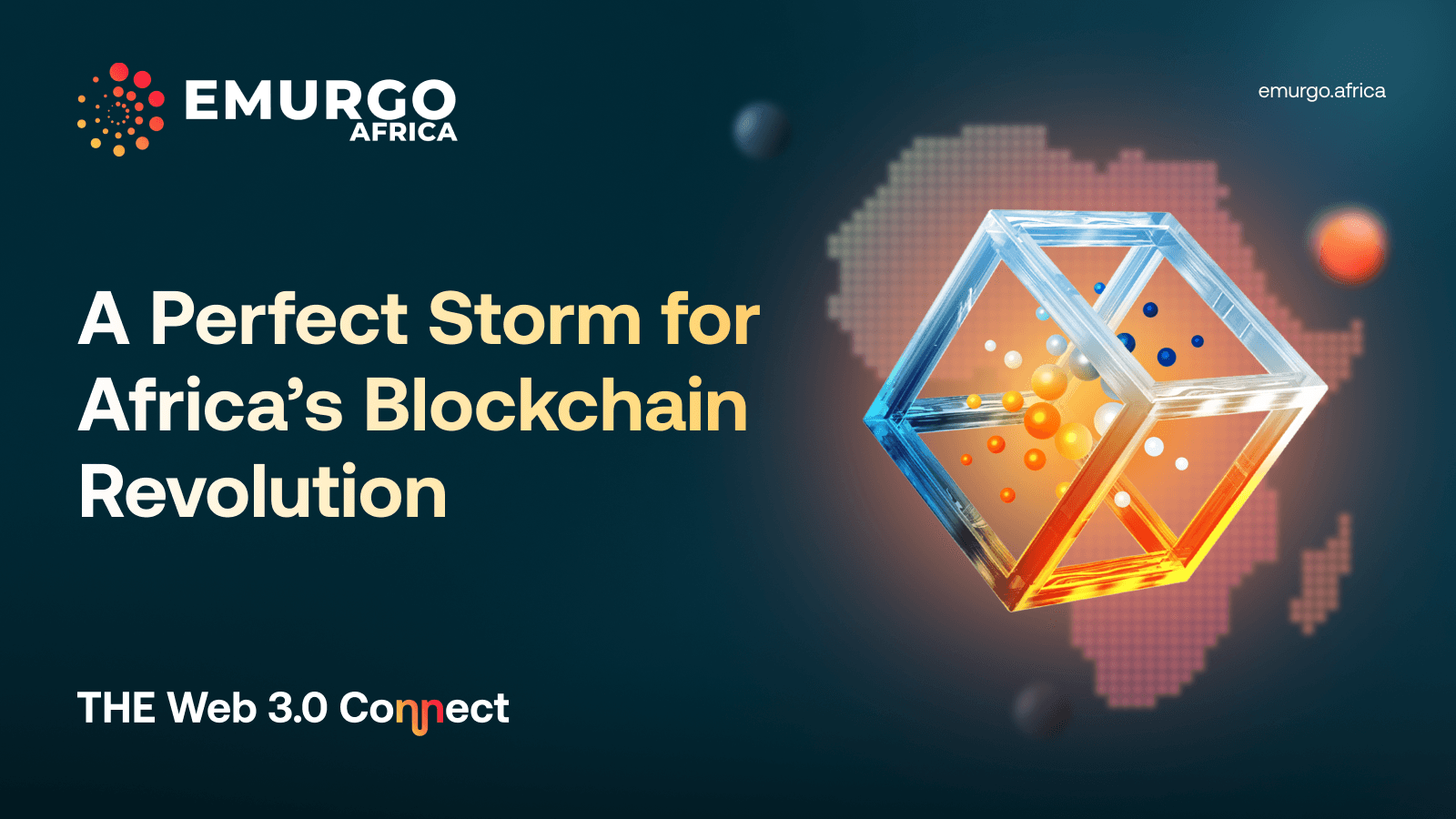By Shogo Ishida, Yosuke Yoshida Co-CEOs, EMURGO Africa
Africa’s Web3 landscape keeps evolving, and new trends are fast molding its future. As 2024 kicks off, Web3 developments of the past year will have an immense impact on decisions made by all industry players this year.
This edition will take you 6 minutes to read.
Key Takeaways
- Nigeria amplifies its crypto adoption rate.
- African governments step up efforts to regulate crypto.
- Blockchain began solving some of Africa’s toughest challenges.
- Web3 startups lure all-time high VC investment before 2023 slowdown.
- Nigeria finally allows banks to process crypto transactions.
Nigeria is No.1 Web 3 Market in Africa
The Chainalysis 2023 crypto report released in September revealed that between July 2022 and June 2023, Sub-Saharan Africa received an estimated $117.1 billion in on-chain value. A huge chunk of this amount, over $55 billion, went to Nigeria, Africa’s biggest economy. The survey affirmed that Nigeria continues to be Africa’s leading crypto market and now has the second highest crypto adoption rate in the world after India. Indeed, a ConsenSys report published in June showed Nigeria leads the world in crypto awareness. Africa’s most populous nation, Chainalysis said, is one of only six countries in the top 50 globally whose crypto transaction volume grew year-over-year.
SOURCE: CHAINALYSIS
A higher crypto adoption in Nigeria in 2023 stems from the fact that the local currency, Naira, has been plummeting against the US dollar, encouraging a parallel forex market which further hurts the strength of the Naira. The Central Bank of Nigeria redesigned the currency in 2022 to curb counterfeit currency, reduce the number of banknotes in circulation while pushing for a cashless economy, according to Business Insider. However, the AP reported, this created a cash shortage in 2023, in an economy that predominantly is cash-centric. This meant people could not pay for basic goods, opening another opportunity for cryptocurrencies.
At least 10 business ventures in Nigeria currently accept bitcoin payments. In no country in Africa is bitcoin more dominant than in Nigeria, as it makes up the biggest share of transaction volume. Residents in the country are turning to bitcoin and stablecoins as an alternative store of value and a cushion against inflation and a plunging Naira. Trading Economics data shows Nigeria’s inflation rate climbed to 28.9% in November 2023. Bloomberg reported that the naira plunged by 23% to a historical low of 1,099 naira per dollar in December 2023 as dollar shortage persists.
Governments Rush for Lawmaking to Govern Crypto Trade
In 2023, Namibia, Kenya, Ghana and South Africa embarked on legislation to govern crypto trade in their jurisdictions, paving the way for more Web3 investment.
Namibia in July officially approved the licensing of crypto platforms. Though this doesn’t mean crypto is legal tender just yet, but the Namibia Virtual Assets Act of 2023 now mandates all crypto platforms in the country to hold a license before they can operate.
In August, Kenya’s parliament asked the Blockchain Association of Kenya to come up with a crypto bill to regulate the industry. Now a $20 billion crypto market, in December, parliament advanced efforts to set up a crypto law in 2024. This followed Kenya’s suspension of Sam Altman-founded crypto startup Worldcoin over data privacy concerns.
In October, the Ghanaian central bank, also known as Bank of Ghana (BOG) hosted a 12-week hackathon, allowing fintech startups, developers and innovators to develop solutions that explore various use cases of a Central Bank Digital Currency (CBDC) - the eCedi - in financial inclusion. Ghana has the highest inflation rate in Africa and believes crypto offers a path towards alternative ways towards currency fluctuation.
The South Africa Financial Sector Conduct Authority (FSCA) finally declared that crypto assets are financial products. Effective October 19, 2023, all crypto was subject to FSCA regulation, under section 1(h) of the Financial Advisory and Intermediary Services Act (FAIS) Act. This followed a draft legislation published on November 20, 2020 to bring crypto-asset-related financial services providers under the regulator’s radar.
Ethiopia, Rwanda, Uganda Tap Blockchain As Remedy
Five countries - Ethiopia, Rwanda, Nigeria, Uganda and Egypt - found blockchain a vital technology in addressing their socio-economic problems.
In March, research and engineering firm Input Output Global (IOG) revealed that the Ethiopian government is deploying blockchain across over 3,600 schools to help 5 million students and 750,000 teachers eliminate fraud in education. In April 2022 alone, it was reported that the government identified over 200,000 fake degree certificates, hence the need for blockchain to restore honesty in the education sector.
In April, Rwanda announced the use of blockchain technology to track the origin of natural minerals that are imported and exported from the country. The mineral business in the country is often accused of failing to comply with trade regulations but the government believes the use of blockchain in the extraction and trade of natural minerals will end the doubts whether Rwanda has minerals and help minimize the conflicts and insecurity that arise due to mining activity in the region.
In September, Cross River State in Nigeria partnered with OmniIndex, a web3 data platform, to secure the data of students in the state. Accuracy, privacy and security of data is a big challenge in Nigeria’s schools. The partnership will see the OmniIndex help the Federal Ministry of Education upgrade Nigeria’s educational data management infrastructure and introduce fully encrypted analytics and a single source of truth for the data of 500,000 students.
Uganda’s government partnered with the Technology Associates & CargoX consortium (TA-CargoX) to establish a blockchain-based national trade facilitation platform called TradeXchange in October. Uganda is confident the technology will assist exporters alleviate trade bottlenecks, enhance compliance to international trade laws and boost its export volumes.
In the same month, the government of Egypt introduced a blockchain trade facilitation technology—the Advance Cargo Information (ACI) system— to fully automate customs processes and improve import processing time and reduce costs. Early data shows the technology has improved processing time by 55%.
VC Money Poured in Africa’s Web3 Hits All-time High
Before a slowdown in 2023, Africa’s Web3 startups attracted a record amount of venture capital investments. In 2024, VC money flowing into Africa may rise, thanks to more regulation in the industry.
The 2023 Africa Blockchain Report compiled by Swiss venture capital company CV VC and South Africa’s Standard Bank last April showed web3 startups in Africa raised a total of $474 million in 2022, compared to $89.6 million a year earlier. That means investment in Web3 rose by five times.
SOURCE: CV VC
Venture rounds accounted for the vast majority of funds raised in Africa, obtaining 91.4% of the funding from 12 deals, up from 43% from six deals in 2021. Custody and exchanges was the highest performing industry category in 2022, raising $250 million, and accounting for more than 50% of all blockchain funding. This was followed by fintech ($115.3 million), infrastructure and development ($67.8 million), NFTs, gaming and metaverse ($32.2 million), with decentralized finance (DeFi) closing the top five categories at $3.9 million.
Blockchain venture funding, as a percentage of all venture funding, achieved a record 15% share of all sector-agnostic venture financing in Africa. This was more than double the global average, highlighting the continent’s continued emergence as a vital blockchain-startup investment destination.
According to the Africa: The Big Deal report, startups throughout Africa collectively garnered $2.9 billion in funding in 2023, a decrease from the $4.8 billion raised in 2022, Business Day reported. Despite this decline, the results surpassed expectations, especially considering the global downturn in venture capital activity during that period.
The survey revealed that 500 startups secured a minimum of $100,000 in funding in 2023, marking a 39% reduction compared to the 821 startups that achieved this in 2022. Nevertheless, the report highlighted that the average deal size remained consistent between 2022 and 2023, providing a ray of optimism amid the challenging global economic conditions.
Nigeria Allows Banks to Go Crypto, Approves State Blockchain Policy
As crypto demand keeps soaring in Africa’s most populous nation Nigeria, regulation is fast taking shape. This is set to create investor confidence as venture capitalists from across the world keep monitoring the web3 space in Lagos.
In Nigeria, a December 22 circular to commercial banks removed curbs on banks against facilitating crypto transactions, CoinTelegraph reported. This set up a fierce battle between crypto exchanges and peer-to-peer merchants. However, experts opined that the move would propel the growth of the crypto industry in the country. “So, right now, it’s going to be the survival of the fittest as crypto-fiat exchanges and P2P merchants battle for the largest crypto P2P market in the world,” Nathaniel Luz, co-founder and chief marketing officer of Flincap, told CoinTelegraph.
But on Jan 4, 2024, the central bank issued new guidelines stating that crypto providers can open bank accounts but no cash withdrawal is allowed. The restrictions also bar clearing third-party checks through crypto accounts. It further clarified that banks are still banned from holding, trading crypto for themselves.
As crypto adoption rises in the country, the Nigerian joins other African nations in extending oversight of cryptocurrencies, spurred by a string of corporate crypto collapses capped by the bankruptcy of Bahamas-based exchange FTX in April.
On May 3, the Nigerian government under former president Muhammadu Buhari approved a national blockchain policy (pdf), setting the pace for greater transparency, increased efficiency, enhanced trust and more secure transactions in both the public and private sectors. Being Africa’s biggest digital economy, Nigeria became the first country in the continent to come up with an implementation structure of blockchain in sectors like finance, government services, digital identity, land registration and supply chain management services.
Before it was approved, current president Bola Tinubu said in March that his government would “reform the policy to encourage the prudent use of blockchain technology in banking and finance, identity management, revenue collection and use of crypto assets.” The policy identifies three focus areas for the implementation strategy: talent development, innovation and blockchain adoption. Over 30,000 Nigerians have already been trained on blockchain technology.
DISCLAIMER: The information in this content (website or other form) does not represent an offer or commitment to provide any product or service. The analysis, opinions and estimates expressed in this content are those of the respective authors, and may differ from those of EMURGO Africa and/or other EMURGO Africa employees and affiliates. Copying, re-publishing or using this material or any of its contents for any other purpose is strictly prohibited without prior written consent from EMURGO Africa.



